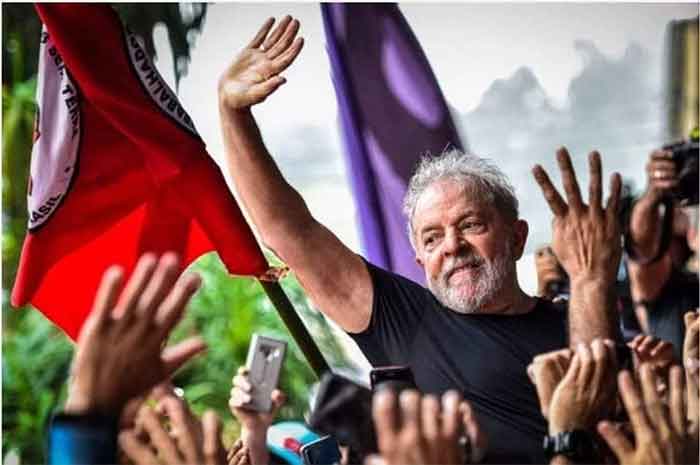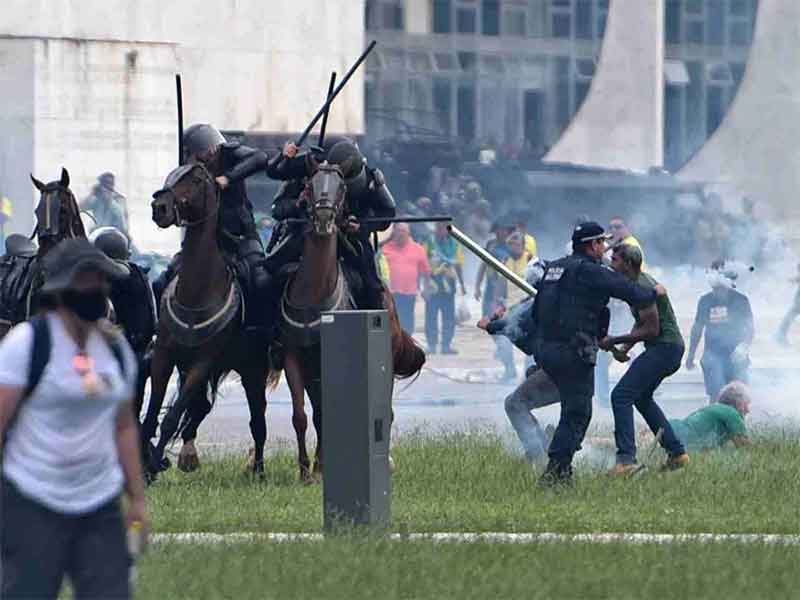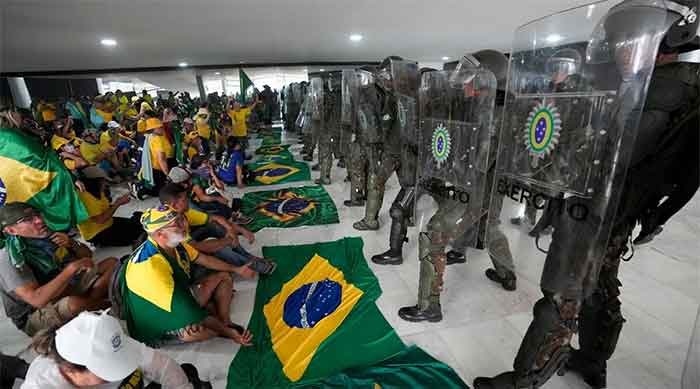
After enduring lawfare , jail, and persecution, Luiz Inácio Lula da Silva was once again elected president in Brazil.
Former president Lula da Silva has clinched victory over his right-wing rival Jair Bolsonaro in a tightly contested second round of Brazilian election on Sunday. The country’s election authority announced Lula’s victory with 50.90% of the vote to Bolsonaro’s 49.10%.
At 00:18 (local time) this Monday, October 31, the Superior Electoral Court of Brazil confirmed on its website the closure of the count in one hundred percent of the 472,075 polling stations open in the country for the second round of the elections in which the presidency was defined.
The website of the Superior Electoral Court reported an attendance at the polls of 79.41% (124,252,796) of voters and an abstention of 20.59% (32,200,558). 118,552,353 valid votes (95.41%), 3,930,765 invalid votes (3.16%) and 1,769,678 blank votes (1.43%) were counted.
The 77-year-old, whose once-bushy hair and trademark beard have gone white, relied on unmatched political instincts and charisma to overcome intense skepticism of his Workers Party (PT), which oversaw a deep recession and vast corruption scandal that eventually brought Bolsonaro to power.
Bolsonaro, 67, a former army captain, has previously made baseless claims of widespread election fraud, raising fears that he will not accept the results. He has so far remained silent over Lula’s win.
Democracy Comes Out Victorious
“This is not a victory of mine or the Workers Party. It is the victory of a democratic movement that formed above political parties, personal interests and ideologies so that democracy came out victorious,” Lula told a cheering crowd of supporters in Sao Paulo on Sunday night.
Lula called his victory over far-right President Jair Bolsonaro by a tight margin in a runoff on Sunday a “resurrection” after he was jailed in Brazil’s biggest corruption scandal following his two-term 2003-2010 presidency.
“They tried to bury me alive and I am here to govern this country,” he said in a speech at his campaign headquarters on Sunday night, with his gravelly voice hoarse from months on the campaign trail.
The president-elect acknowledged that following such a tight race a challenge to his future mandate will be “immense,” and stressed that “it is necessary to rebuild the very soul of this country, recover generosity, solidarity, respect for differences and love for others.”
Lula, who is set to take office on 1 January 2023, promised to be a president for all 215 millions of Brazilians, not just those who voted for him.
Lula said: “There is no two Brazilians. We are one country, one people – a great nation.”
Bolsonaro has yet to publicly concede his defeat. The incumbent repeatedly warned during his campaigns that he will contest the results if he loses by a small margin, calling into question the reliability of Brazil’s electronic voting system.
After polls closed nationwide at 5pm local time (8pm GMT), initial results showed Bolsonaro ahead. However, just as in the first round of voting his lead eventually narrowed as more votes from da Silva’s strongholds were counted. In the first round on October 2, da Silva received over 48% of the vote, which was not enough to claim immediate victory.
Lula da Silva, who represents Brazil’s PT, has focused his campaign on overcoming social inequality and alleviating poverty. Among the measures he proposes are raising taxes on the rich, widening the social safety net, and increasing the minimum wage.
Bolsonaro’s campaign slogan has been ‘God, family, homeland, and liberty’. His vision of Brazil’s future includes privatizing the country’s state-owned oil company, opening the Amazon region to more mining, and easing gun regulations.
In the run-up to the showdown, the rivals repeatedly traded insults during campaign events. In a televised debate on October 17, Lula called Bolsonaro a “tiny little dictator” and pledged to defend freedom and democracy.
The incumbent fired back, calling Lula “a national embarrassment,” due to the corruption scandals that took place when Lula’s PT was in power.
Lula, who governed Brazil from 2003 to 2010, was barred from running for president in 2018 after being jailed on corruption charges that were later overturned.
A Former Metalworker
The leftist leader Luiz Inacio Lula da Silva, is the country’s first working class president, whose storied political career nearly ended in prison.
A former metalworker born to illiterate farm hands, Lula has been the most central figure in Brazilian politics for four decades, since leading labor union strikes against a military dictatorship in the 1980s and forming the leftist PT.
Lula has vowed to undo Bolsonaro’s legacy, including pro-gun policies and weakened environmental protections in the Amazon rainforest, which have left Latin America’s largest nation increasingly isolated on the global stage.
The Most Popular Politician On Earth
The man former U.S. President Barack Obama once called “the most popular politician on Earth” left office 12 years ago with a record 87% approval rating. His policies lifted millions from extreme poverty, expanded access to education and healthcare, and reduced Brazil’s deep social inequalities during years of robust growth driven by a global commodities boom.
His presidency also reinvigorated Brazil’s oil and ship-building industries, while its economy rose to sixth-largest in the world. Brazil’s global prestige hit new levels as it was chosen to host the Olympics and soccer World Cup.
However, Lula’s legacy was tarnished amid revelations of a vast kickback scheme on public contracts, benefiting leaders from major political parties, including his own. That and a deep 2015-2016 recession built momentum for the impeachment of his hand-picked successor, former President Dilma Rousseff.
Lula was also put on trial for receiving real estate and other gifts as bribes from engineering firms snagged in the graft probe. He was convicted in 2017 and sentenced to 9-1/2 years in prison.
The convictions barred him from running for president in 2018, when Bolsonaro rode into office on a wave of conservative reaction and antipathy towards the PT.
The former president was freed after 19 months, and Brazil’s Supreme Court annulled his convictions because of improper jurisdiction, after the judge overseeing his prosecution was found partial. Lula always denied the charges and said his enemies had framed him to remove him from Brazilian politics.
Lula reemerged from prison as a pragmatic politician vowing to fight rising hunger and unemployment by channeling public loans and investment into strategic industries while pledging fiscal responsibility.
He forged a broad center-left coalition including left-wing social movements and his centrist rival from the 2006 election, former Sao Paulo Governor Geraldo Alckmin, who has helped to calm investors fearing more interventionist economic policy.
Lula promises to attract foreign investment by restoring Brazil’s credibility as a steward of the Amazon rainforest, where Bolsonaro let deforestation soar to a 15-year high.
Lula moderated his left-wing image in the final stage of the campaign, swapping the bright red colors of his PT for white clothing, while making more biblical references as he reached out Brazil’s growing evangelical Christian community.
After losing his first wife to a stroke while he was in prison, Lula remarried last year to sociologist Rosangela da Silva, known as Janja.
A heavy smoker for years, Lula was treated with chemotherapy for throat cancer in 2011, deepening his gruff baritone.
Global Leaders Reaction
Leaders around the world have congratulated Brazilian President-elect Lula da Silva.
Reactions are reaching from different parts of the world. Among them are leaders of Venezuela, Mexico and Bolivia.
Other figures in the region have also sent their congratulations through the social network Twitter, such as the vice president of Colombia, Francia Márquez, and former presidents Evo Morales and Rafael Correa, of Bolivia and Ecuador, respectively.
The Cuban president, Miguel Díaz-Canel Bermúdez, joined the congratulations that the leader of the Workers’ Party is currently receiving.
Bruno Rodríguez Parrilla, Minister of Foreign Affairs of Cuba, left his message on the social network Twitter.
Venezuela’s Nicolas Maduro tweeted “a big hug” to Lula, adding, “Long live the peoples determined to be free, sovereign and independent! Today in Brazil democracy triumphed.”
Mexican President Andres Manuel Lopez Obrador tweeted: “Lula won. The people of Brazil are blessed. There will be equality and humanity.”
Argentina President Alberto Fernandez celebrated “a new era” for Latin America’s history with Lula’s win. “A time of hope and future that begins today,” Fernandez tweeted. “Here you have a partner to work with and dream big about the good life of our peoples.”
Chilean president Gabriel Boric, who was elected last year, tweeted simply: “Lula. Joy!”
Another Latin American leftist, Colombia’s recently-elected President Gustavo Petro, also kept his post-election message short: “Viva Lula.”
U.S. President Joe Biden congratulated Lula for his victory in Brazil’s “free, fair and credible elections,” saying in a White House statement that he looked forward to cooperation between the two countries.
On Twitter, U.S. Secretary of State Antony Blinken also extended his congratulations to the Brazilian people “for exercising their right to vote and reaffirming the strength of their democracy.”
Canadian Prime Minister Justin Trudeau said he hopes to work with Lula to advance shared interests, including protecting the environment.
French President Emmanuel Macron said Lula’s win “opens a new page” in Brazil’s history. “Together we will join forces to address the many common challenges and renew the bond of friendship between our two countries,” he tweeted.
Josep Borell Fontelles, EU High Representative for Foreign Affairs and Security Policy, commended the “peaceful and well-organized election.” Fontelles said he hopes to advance EU-Brazil relations under Lula.
Australian Prime Minister Malcolm Turnbull wished Lula success in advancing collaboration between the two nations, adding that his win will “encourage democrats everywhere” and “give new hope for the Amazonian and global environment.”
Lula’s first international meeting as president will be with his Argentine counterpart
Lula’s first international meeting as president-elect will be with his Argentine counterpart, Alberto Fernández, who will arrive in Sao Paulo on Monday, according to O Globo, citing sources from the Casa Rosada. This is reported by several media outlets.
While La Nación points out:
“Lula’s victory is deserved and is good for the region,” said the president at 7:50 pm in an interview with Radio 10, when the trend in favor of the PT leader was already irreversible. “The link between Brazil and Argentina will be deeper, more realistic and more sincere,” he added, expressing his hope that “Argentina, Brazil and Mexico could form an axis, it would be very good for the entire continent.”















































